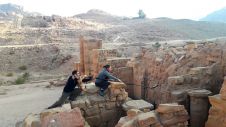Symposium on Innovative Technologies for Land Administration
This symposium, held at the University of Wisconsin in Madison (WI), USA from 24th to 25th June 2005, was organised by FIG Commission 7 on Cadastre and Land Management. Land Administration includes processes of land registration, cadastre, valuation and land inventory. Every country in the world pursues these activities in one form or another and, whatever the stage of development, technology plays a role in executing these tasks. Developing countries face the challenges of pro-poor land management and administration and aim at enhancing authority services as quickly as possible; they worry about how to organise the provision of relevant land information as support for governance. Traditional approaches to land administration result in long delays to design and implementation projects, even such that land laws are adapted to provide for simpler procedures. Unconventional approaches are urgently needed, both from a conceptual and a technological point of view. Technology plays an important role, although its success depends on the link with societal needs. In particular, technology is a major facilitating factor for speeding up processes. Countries in a further stage of development have enjoyed benefits of IT application at an earlier stage but many now face renewal of their IT architecture due to their existing information systems no longer being able to cope with evolving customer demand and IT opportunities.
The Symposium
About sixty experts in ICT, land administration and
surveying representing the Geo-ICT industry and land administration organisations participated. Underlined was the relevance of alignment between the business of land administration and ICT at strategic and operational levels and the, often underestimated, impact on organisations. The Land Management Paradigm was introduced and discussed. An impressive introduction to reconstruction land administration in post-conflict conditions and the role, (non-)acceptance and implementation of information technology in this was given.
Companies such as Oracle, ESRI, Intergraph, Bentley, CARIS and Leica gave their views on further developments in data acquisition, processing and dissemination relating to land administration. There was a great deal of attention for 3D data processing and 3D Cadastres and GPS-based data collection, with very nice examples from Seiler Industries of distributed data management in an open environment. Intergraph gave its view on simplifying the business of land administration. DataGrid International gave a very impressive contribution on strategies and technologies for integrated land administration and management of national resources, the focus of which was on developing countries, with easy-to-learn and efficient technologies for data collection. International Land Systems discussed using ICT to drive business processes change with land registry offices. Representatives from the Open Geospatial Consortium and the US Federal Geographic Data Committee highlighted how standards enhanced data and the international development of spatial data infrastructures. The importance of standardisation of the cadastral domain was discussed. One remark in relation to this was that any debate concerning whether the system should be deed or title-based should end forthwith and be refocused on well-performing land administration systems; many national organisations failed in this for both institutional and managerial reasons.
Conclusions
According to Paul van der Molen, chair of Commission 7, the outcomes of the symposium are to be used to further develop opinion on the role and importance of ICT in land administration to the World Bank, the United Nations, government and professionals. Land administration is not an end in itself; it serves society, whether in poverty reduction, pro-poor land management or 3D legal volumes and their registration. From this point of view, all land administration organisations face similar challenges. According to many global reports, land administration should be less bureaucratic, simple, cheaper and more transparent. The content of the symposium made clear that these goals were hard to achieve if the support of ICT were not taken as a prerequisite. The World Bank, in many countries an important provider of funds for land administration, as well as other international organisations, sometimes saw low-cost approaches as conflicting with ICT. The Commission feels there might be a need to redefine the role and importance of technology in realising world objectives.
What emerged from presentations was that most low-cost approaches require high technology. One further consideration is awareness on the part of land administrators of strategic management. Many leaders of land administration organisations are distanced from strategic issues and are kept too busy with the daily problems experienced in service delivery. However, leadership is necessary to develop the future in accordance with clearly set government requirements. If this is not achieved, leaders can be replaced, as is usual in business life. A specific example of this was discussed by the symposium.
Paul van der Molen
Christiaan Lemmen
FIG Commission 7
4th FIG Regional Conference for Latin America and the Caribbean - CANCELLED
After careful consideration the FIG Council has decided to cancel the 4th FIG Regional Conference which was scheduled for Havana, Cuba from 26-29 September 2005. The decision is based on information provided by UNAICC and the tight time-schedule. It was decided that pratical arrangements regarding venue, registration and other matters were compromised.

Value staying current with geomatics?
Stay on the map with our expertly curated newsletters.
We provide educational insights, industry updates, and inspiring stories to help you learn, grow, and reach your full potential in your field. Don't miss out - subscribe today and ensure you're always informed, educated, and inspired.
Choose your newsletter(s)
























